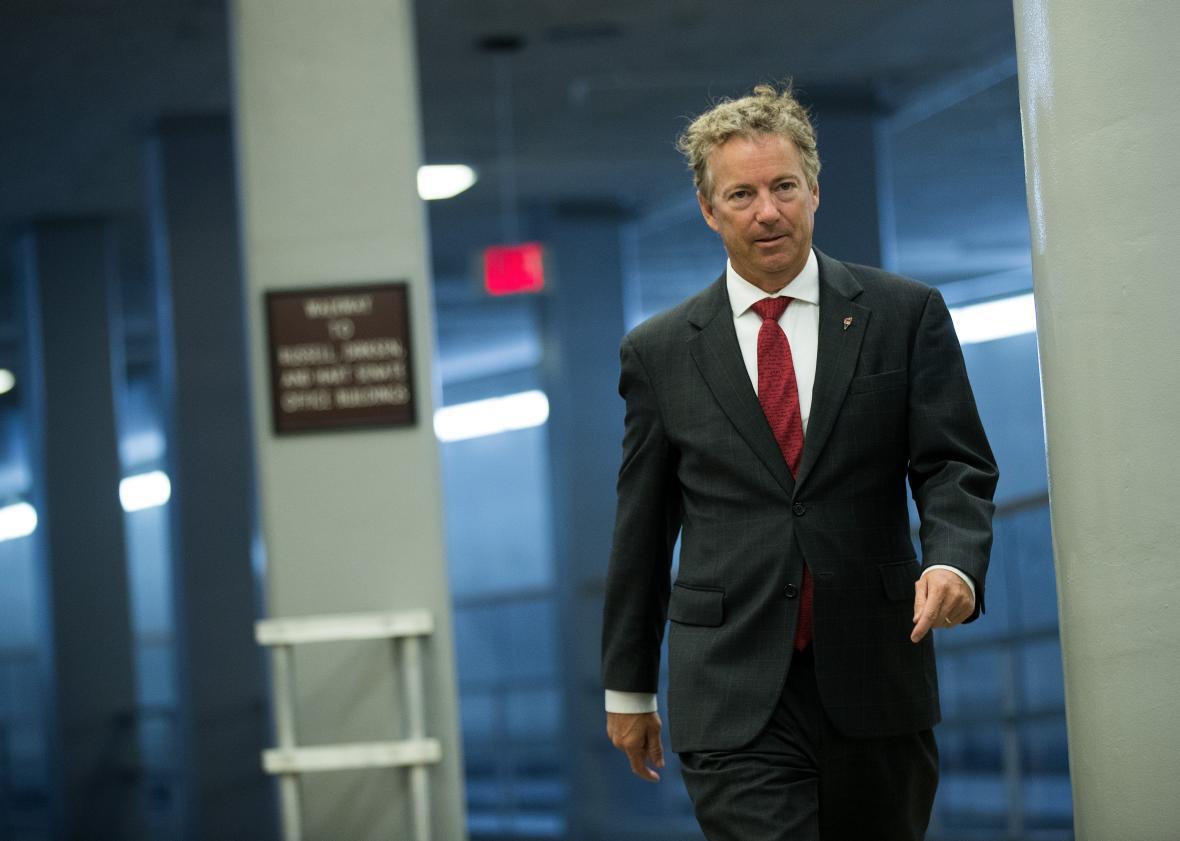Want to listen to this article out loud? Hear it on Slate Voice.
Kentucky Sen. Rand Paul is just as shocked as you are.
“I had thought that it was completely dead, gone, buried, and there wasn’t going to be any more attempts,” the senator told reporters in his office Monday afternoon, referring to Senate Republicans’ efforts to repeal and replace Obamacare. “I’m kind of surprised that this has been resurrected cause I don’t think it’s been fully thought through.”
Paul said that two weeks ago, he would have given the Graham-Cassidy bill a “zero” percent chance of passing the Senate, but now he’s “worried.” He doesn’t even have to go back two weeks. He told me last Tuesday that he gave it a zero percent chance. That seemed like an accurate assessment at the time, before the Republicans’ rousing pep rally during last Thursday’s caucus lunch.
But the pep talk has not moved Paul. And from the sound of him Monday afternoon, it won’t. If that holds, it could spell Graham-Cassidy’s end.
Paul describes the bill, which replaces Obamacare’s subsidies and Medicaid expansion with block grants to states for their own experimentation, as one that “keeps 90 percent of Obamacare and redistributes the proceeds.” He calls it just a “game of Republicans sticking it to Democrats.”
“It just looks like the Republicans are taking the money from the Democrat states and giving it to the Republican states,” he said Monday. He observed, too, that if Graham-Cassidy were to become law, Democrats could later adjust the formula used to determine block grant amounts to favor blue states. “So we’re going to go through year after year of Republicans fighting Democrats over the formula?”
Paul represents a mostly red state, but a relatively unique one in the health care wars, which could explain his thinking. During Obamacare’s implementation, Kentucky happened to have a term-limited Democratic governor who embraced all that the Affordable Care Act had to offer, and many Kentuckians gained coverage. It’s not just blue states that would lose money under Graham-Cassidy’s block grant formula. Kentucky would, too.
“If you didn’t expand [Medicaid], you get a ton of money,” Paul said about changes that would come under Graham-Cassidy. “Mississippi’s going up 900 percent, North Dakota 600 percent. So there’s a ton of money out there for non-expansion red states.”
Paul is definitely one of the most difficult votes for Repulican leaders to secure here. The other two are Maine Sen. Susan Collins and Alaska Sen. Lisa Murkowski. One of the three of them will need to support Graham-Cassidy for it to pass. (In addition to the other 49 senators, all of whom can’t be considered sure things just yet.) But Collins and Murkowski have each objected to every single Republican repeal attempt so far, and this approach is arguably worse in both rushed process and policy. That would seem to put the pressure on Paul to get on board from the conservative end of the spectrum.
If so, he’s not feeling that yet. “I’ve been a loud advocate for repeal of Obamacare, something that looks like repeal,” he said. “This does not look, smell, or even sound like repeal. This is a keep. This is Obamacare Lite.”
